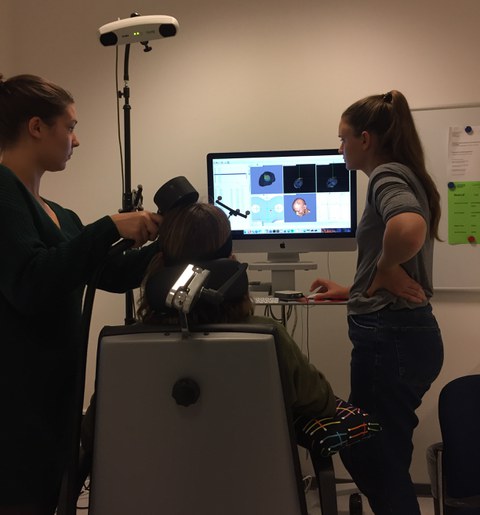Transcranial Magnetic Stimulation

TMS and Neuronavigation
Neuroscientific studies implementing TMS are growing in popularity because unlike more indirect measurement methods (e.g. fMRI) they allow us to draw a causal link between a cortical area and a cognitive process.
We differ between two types of studies: online- and offline-TMS. For online-TMS studies the participant is completing a certain task (e.g. a computer experiment) during stimulation. The alternative is for the participant to first be stimulated (mostly for 10-20 minutes) and then to complete the task afterwards. This is called offline-TMS. For offline-TMS it is important to note, that the task must be completed as soon as the stimulation is conducted since the effects of the stimulation don't last long (up to 10-15 minutes).
For the stimulation a cole, which induces a magnetic field, is applied on the head. This magnetic field creates an electric puls on the surface of the brain (cortex). Depending on how TMS is used, the underlying cortex can either be faciliated or inhibited in its functions.
When conducted properly TMS is not expected to have harmful consequences for the participants. By inducing a puls a light sensation is created on the scalp which can best be described as "mild tapping". Even though this is not painful it can be uncomfortable so it's important to note that all of our studies follow the international TMS guidelines and are approved by the Dresden University of Technology Health System Institutional Review Board (IRB). Prior to conducting studies using TMS research and student assistants have to complete a standardized training lasting several weeks as well as a test in the end, both supervised by Franziska Korb, who herself completed an intensive-course on TMS at the Berenson-Allen Center in Boston. Also, if the stimulation feels intolerable our research volunteers can withdraw from participation at any time without having to give reasons and without any consequences.
To give you a better idea of TMS, a video (with english subtitels) submitted by the Max-Planck Institute for human cognitive and brain sciences, where Franziska Korb has been working for several years and also conducted her first TMS research project, is linked in the following.
Participants will receive a compensation up to 10€ per hour.
If you would like to participate in one of our research projects or if you have questions concerning TMS feel free to contact us via our E-Mail address.
Important note: We use TMS only for research purposes on general-psychological and neuroscientifical research questions. We don't work with neurological or psychiatric patients and are not able to provide any kind of treatment.